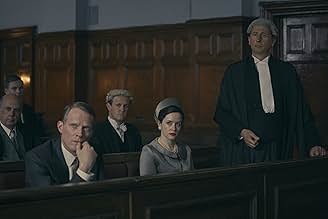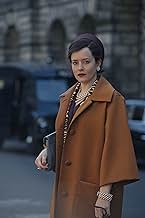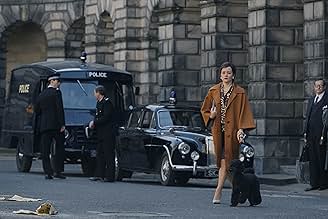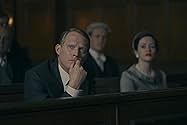L'histoire des événements entourant le divorce notoire du duc et de la duchesse d'Argyll dans les années 1960.L'histoire des événements entourant le divorce notoire du duc et de la duchesse d'Argyll dans les années 1960.L'histoire des événements entourant le divorce notoire du duc et de la duchesse d'Argyll dans les années 1960.
- Nommé pour 1 Primetime Emmy
- 6 victoires et 8 nominations au total
Parcourir les épisodes
Histoire
Le saviez-vous
- AnecdotesPROLOGUE: "The following is based on a true story. Some elements have been created or changed for dramatic purposes."
Commentaire à la une
Lifestyles of the rich and famous, part three. This was the latest BBC dramatisation of notorious court cases of the just-about-in-living-memory recent past involving prominent high-society individuals, after their previous treatments of the Jeremy Thorpe/Norman Scott affair and the Profumo scandal. This latest three-parter concerned the sensationalised divorce proceedings brought by the then Duke of Argyll in 1963 against his wife, the Duchess Margaret for her alleged marital infidelities. All three series are concerned with privilege, class and sex, particularly the latter in this case, as the claimed bedroom indiscretions of the Duchess were ruthlessly, not to say illegally used by her estranged husband to discredit, disgrace and indeed destroy her public persona to grant him his desired divorce.
It's important to point out that the Duchess was in her early 50's when the case came to court so her licentious behaviour couldn't be said to be merely down to the fecklessness of youth. No, this was a mature woman, who we see early in the piece, put down one of her chiding friends by confidently asserting and indeed boasting about her sexual prowess with men. The daughter of a self-made commoner millionaire and divorcee of another self-made millionaire, this time American, who was the debutante of her year when "coming out" in society, by the time she hitched up with the Duke of Argyll in the early 50's she's still a prize acquisition for any hard-up Scottish Duke needing to bankroll the expensive upkeep of his castle and estate, never mind indulge a pipe-dream to excavate a sunken ship in the local bay said to contain a fortune in buried treasure.
Margaret was obviously attracted by the prestige of becoming a Duchess and being the lady of the manor, but things palled quickly as she learned just why her new husband's two previous wives had divorced him. A controlling, often drunken, sometimes violent, frequently unfaithful man, her fairytale marriage begins to collapse and when her rich daddy himself remarried a younger woman and decided to turn off the flow of funds he'd been pouring into his son-in-law's bottomless pockets, it's she that the Duke blamed when his bills piled up. So she took refuge in the London party scene, picking up often younger men, sometimes for sex, but sometimes only for conversation and sympathy, especially given that a lot of them were gay.
Finally the marriage fell apart with the scorned Duke stopping at nothing to get the dirty on the "Dirty Duchess" as those scandalised protectors of decent behaviour, the British press, later termed her, to the extent of breaking into her London flat to steal her personal diary and other incriminating titbits, most infamously a snap-shot selfie, if you will, of her and one of her lovers indulging in an act of fellatio. It all ends up in a sensational divorce court trial where Margaret is excoriated for her lifestyle while her smug husband looks on.
Much has been said in today's press about the treatment meted out to Margaret by her brutish husband, although she wasn't above perpetrating a few dirty tricks of her own, like forging an incriminating letter by one of her husband's ex-wives and even accusing him of an affair with her new step-mother. Nevertheless, it's clear that she was more sinned-against than sinner but in the early 60's when class consciousness was very much in the air in what was still very much a male-dominated world, there was no way she could ever win.
As for this particular dramatisation, as usual the BBC nailed the setting of time and place, in terms of fashion, interiors, cars etc, although there were some odd choices of background songs which didn't seem to fit. Paul Bettany was excellent as the dastardly duke but I felt that Claire Foy was miscast as the Duchess, besides not sufficiently resembling her real-life counterpart, she seemed too young and not tall enough in the part. Elsewhere, while I think the narrative was comprehensive enough in incorporating most of the main facts, some scenes did have a manufactured look about them and others similarly appeared over-cooked.
Long dead now, at least this revisionist take on the Duchess's often tempestuous life might go some way towards posthumously restoring her reputation, hopefully at the expense of her monstrous, manipulative husband, even as I appreciate she was no angel herself.
Frankly though, if this is how the other half lives, they can keep it.
It's important to point out that the Duchess was in her early 50's when the case came to court so her licentious behaviour couldn't be said to be merely down to the fecklessness of youth. No, this was a mature woman, who we see early in the piece, put down one of her chiding friends by confidently asserting and indeed boasting about her sexual prowess with men. The daughter of a self-made commoner millionaire and divorcee of another self-made millionaire, this time American, who was the debutante of her year when "coming out" in society, by the time she hitched up with the Duke of Argyll in the early 50's she's still a prize acquisition for any hard-up Scottish Duke needing to bankroll the expensive upkeep of his castle and estate, never mind indulge a pipe-dream to excavate a sunken ship in the local bay said to contain a fortune in buried treasure.
Margaret was obviously attracted by the prestige of becoming a Duchess and being the lady of the manor, but things palled quickly as she learned just why her new husband's two previous wives had divorced him. A controlling, often drunken, sometimes violent, frequently unfaithful man, her fairytale marriage begins to collapse and when her rich daddy himself remarried a younger woman and decided to turn off the flow of funds he'd been pouring into his son-in-law's bottomless pockets, it's she that the Duke blamed when his bills piled up. So she took refuge in the London party scene, picking up often younger men, sometimes for sex, but sometimes only for conversation and sympathy, especially given that a lot of them were gay.
Finally the marriage fell apart with the scorned Duke stopping at nothing to get the dirty on the "Dirty Duchess" as those scandalised protectors of decent behaviour, the British press, later termed her, to the extent of breaking into her London flat to steal her personal diary and other incriminating titbits, most infamously a snap-shot selfie, if you will, of her and one of her lovers indulging in an act of fellatio. It all ends up in a sensational divorce court trial where Margaret is excoriated for her lifestyle while her smug husband looks on.
Much has been said in today's press about the treatment meted out to Margaret by her brutish husband, although she wasn't above perpetrating a few dirty tricks of her own, like forging an incriminating letter by one of her husband's ex-wives and even accusing him of an affair with her new step-mother. Nevertheless, it's clear that she was more sinned-against than sinner but in the early 60's when class consciousness was very much in the air in what was still very much a male-dominated world, there was no way she could ever win.
As for this particular dramatisation, as usual the BBC nailed the setting of time and place, in terms of fashion, interiors, cars etc, although there were some odd choices of background songs which didn't seem to fit. Paul Bettany was excellent as the dastardly duke but I felt that Claire Foy was miscast as the Duchess, besides not sufficiently resembling her real-life counterpart, she seemed too young and not tall enough in the part. Elsewhere, while I think the narrative was comprehensive enough in incorporating most of the main facts, some scenes did have a manufactured look about them and others similarly appeared over-cooked.
Long dead now, at least this revisionist take on the Duchess's often tempestuous life might go some way towards posthumously restoring her reputation, hopefully at the expense of her monstrous, manipulative husband, even as I appreciate she was no angel herself.
Frankly though, if this is how the other half lives, they can keep it.
Meilleurs choix
Connectez-vous pour évaluer et suivre la liste de favoris afin de recevoir des recommandations personnalisées
- How many seasons does A Very British Scandal have?Alimenté par Alexa
Détails
- Date de sortie
- Pays d’origine
- Site officiel
- Langues
- Aussi connu sous le nom de
- Дуже британський скандал
- Lieux de tournage
- Inveraray Castle, Argyll & Bute, Écosse, Royaume-Uni(Inveraray Castle)
- Sociétés de production
- Voir plus de crédits d'entreprise sur IMDbPro
Contribuer à cette page
Suggérer une modification ou ajouter du contenu manquant

Lacune principale
By what name was A Very British Scandal (2021) officially released in Japan in Japanese?
Répondre


































